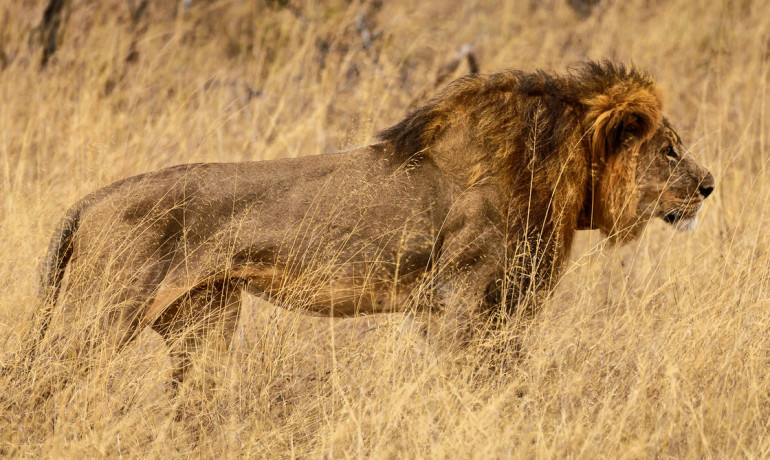The sport of trophy-hunting big game animals, like the recent shooting of Cecil the lion in Zimbabwe, can pose a big risk to depleted populations of endangered wildlife.
But, the United States has the power to discourage such hunting by listing lions as endangered under the Endangered Species Act, a law expert says.
Stanford University writer Clifton B. Parker talked with David J. Hayes, a visiting lecturer at Stanford University, about how Cecil’s death has sparked a national debate over the nature of big game hunting and poaching in Africa.
WHAT WENT WRONG IN THE CECIL THE LION CASE? WAS THE KILLING LEGAL?
It appears that the killing of Cecil the lion was illegal, primarily because Cecil was lured out of a protected area, Hwange National Park, and killed. Enforcement officers at the US Fish & Wildlife Service are attempting to locate the US hunter who killed the lion so they can question him.
WHAT SHOULD BE DONE ABOUT AFRICAN COUNTRIES ALLOWING HUNTERS TO KILL BIG GAME?
The killing of Cecil the lion has put a spotlight on sport hunting in Africa.
Sport hunting poses the most significant risk to wildlife populations whose numbers are depleted. That is why sport hunting of species that are categorized as “endangered” under the Endangered Species Act—like African elephants—is restricted, and is not allowed by US authorities in countries that cannot demonstrate that they are managing their wildlife populations sustainably.
Last year, for example, the US Fish & Wildlife Service disallowed the importation of elephant sport hunting trophies from Tanzania and Zimbabwe because of a concern that those countries were collecting large hunting fees without ensuring overall health of elephant populations within their borders.
Currently, African lions are not categorized as “endangered” and, as a result, the US does not limit lion hunting in African countries, nor does it limit the importation of lion trophies into the US The US Fish & Wildlife Service has proposed to list lions as endangered under the Endangered Species Act and, if finalized, restrictions on lion hunting would kick in.
WHAT CAN THE AMERICAN GOVERNMENT AND POLICYMAKERS DO?
The “uplisting” of African wildlife by the US Fish & Wildlife Service as endangered can reduce hunting pressure by limiting the countries in which such hunting is allowed to those that are effectively managing their wildlife. Also, the US Fish & Wildlife Service can restrict the number of individual trophies that can be imported from qualifying countries within a given year, as it did recently for African elephants.
As a more general matter, the government and policymakers should step up their review of how responsibly African nations are managing hunting practices, particularly for wildlife populations that are under stress from poaching, loss of habitat and other conflicts. Also, while some African countries rely on hunting revenues to support conservation efforts, questions about the linkages between hunting funds to on-the-ground conservation activities, and about the amount of funds that are actually funneled to those programs, need to be answered.
The stakes are very high, particularly given the sophisticated criminal syndicates that are operating in many African countries and arranging for the killings of extraordinary numbers of elephants, rhinos, tigers, lions, and other species, and then marketing ivory, rhino horn, tiger bone, and other wildlife parts in the US, Asia, and around the world. Independent analyses have indicated, for example, that approximately 100,000 elephants have been killed for ivory in the last three years—or one every 15 minutes.
President Obama addressed this issue during his recent visit to Kenya. He announced that the US is continuing to tighten up our ban on the sale of elephant ivory, and he also announced the formation of a public-private partnership to reduce the demand in the US for illegal wildlife products.
ANY OTHER CONCERNS?
One of the major concerns is that the pervasive influence of the illegal wildlife traffickers is corrupting the integrity of African wildlife hunting programs. There have been documented cases in which hunting concessions in Tanzania, for example, have been exploited to provide cover for massive illegal killings and trafficking of wildlife parts.
Fuente: www.futurity.org
